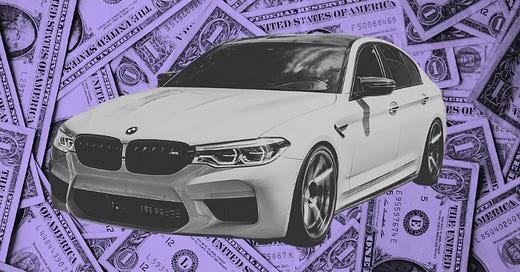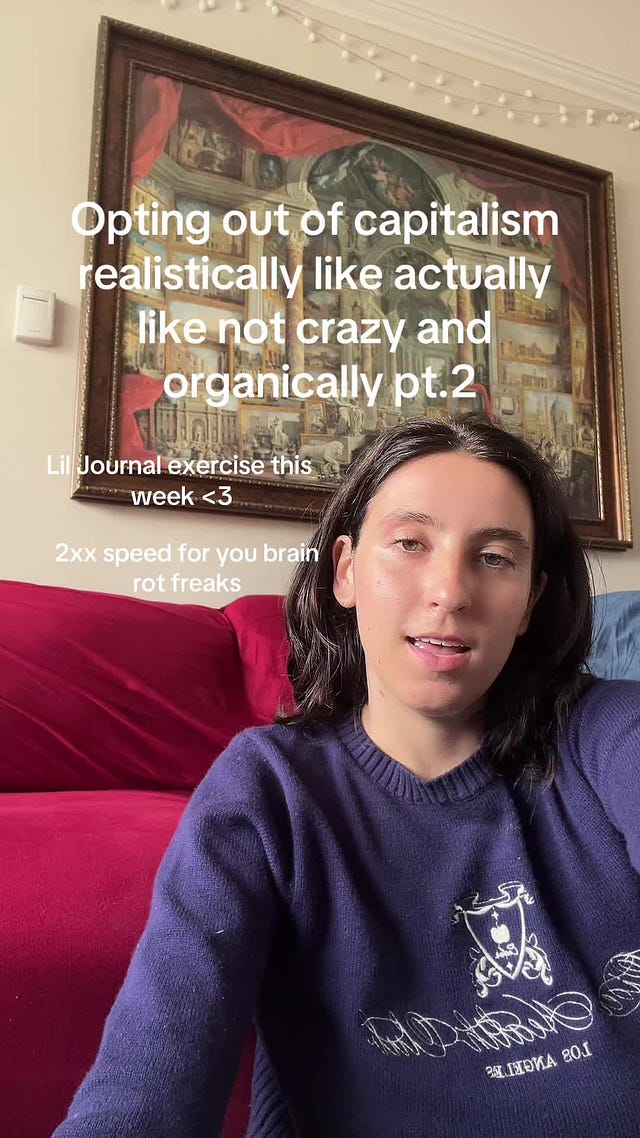I'm in a season of reflection and reevaluation. I've been rethinking the way I approach daily self-care rituals, admin tasks, and creative work. Thanks to rising temperatures and yet another heat wave in the tri-state area from climate change, I've been asking myself things like, Do I even consider myself a summer person anymore because I tend to be inside as much as I am in the winter?
I've also been redefining what success looks like. This has been a process of reconnecting with my own values and how they apply to success.
If you know me IRL, you probably know that the overachiever tendencies I learned in school have trickled into my career as a writer. Given my many writing projects—a memoir project, pitching to publications, writing my first feature-length screenplay, and of course, this Substack—it can be difficult to resist overachiever tendencies, which are just internalized capitalism, or capitalist conditioning. (I use the terms interchangeably.)
In a rather timely fashion, I watched a fantastic video essay about capitalist conditioning by revolutionaryth0t. For the sake of this essay, I'll focus on the TikTok video referenced in said video essay.
 Tiktok failed to load.
Tiktok failed to load.Enable 3rd party cookies or use another browser
"They've created the American Dream to keep the focus on this fiction universe, where we are rich and we're famous and everything works out and I can finally go to the dentist," explains writer Meredith St. John. "The reason why it's so effective is because it instills hope. Now, it's like what do I have to hope for? What's gonna keep me going? I am still pretty relatively powerless, so what do I do about that?"
The TikTok video reminded me of a prior essay I wrote about somatic safety, generational wealth, and Saltburn. Growing up, I lusted after watching a reality series called The Fabulous Life Of.... I watched the show often and consider it deeply formative media, for better or for worse, but mostly for the worse. As a result of this capitalist conditioning, I daydreamed about what it'd like to be rich the way middle class people plan vacations. One of my rich (pun intended) pasttimes was creating wish lists of how I'd spend the wealth, much like how people plan travel itineraries.
A couple weeks ago, I followed the writing exercise posed in the video:
Get out your pen and paper and indulge in your fictional universe. Don't be afraid to be materialistic. If you want the BMW and you want to be a singer that travels all over the world, write it all down. I don't care. Once you've indulged, we're gonna blow it up and break it all down ... What [feeling(s)] does that [fictional universe] give you?
The saying goes "money doesn't buy happiness," which varies upon your socioeconomic status. In my adult life, along with other Leftists, I've argued that yes, money does buy you happiness if you've experienced poverty and have left it at that. That's why I was called to get honest with myself, especially as someone who is a class straddler working in the tech industry.
In response, I jotted down "a big author platform with wide audience and cultural influence." I did something I never really did, that you'd think would be at the forefront of my writing career: I asked why I wanted this, what motivates me as a writer. It seems like an obvious, fundamental question, yet I never thought to pose it.
A previous version of myself just wanted to survive as a writer. Before landing my first full-time writing job—where I was let go after three weeks, I hope sometime I'll get to tell the story publicly—I ghostwrote research papers for an NYU student, a side hustle I snagged from Craigslist. Later, to build my credibility and gain experience early in my career as a freelance writer, I often accepted below-market wages for assignments, often about topics I barely knew anything about.
Today, I'm more interested in pursuing connection through my writing. Like other essayists, as
has written about, I process my emotions through the act of writing and publishing. Underneath that process, as I'm sure Bissel and other writers may have too, lies a my desire to connect with others through my writing: Surely, someone else feels this, too.I understand that my desire for a large audience with wide cultural influence manifests from my desire to connect with others. A "big" platform isn't necessary to connect with others; likewise, I don't think a "big" platform is needed to achieve cultural influence. I'm no NYT Bestseller (yet) but to toot my own horn, Fox News reported on my Teen Vogue explainer about Karl Marx two years after it was published.
When I started this newsletter, I included prompts at the end of each piece. I stopped including prompts because, to me, they felt too forced. I wanted my writing to speak for itself. I also indirectly intended to encourage readers to comment unprompted.
For this edition, though, it feels more natural to pose some questions like the creators cited above. (I also highly recommend the writing prompt I did, too!) Feel free to drop a comment or reply to this email with your responses. Feel free to keep it private too in your journal and/or with your tarot deck!
Have you ever interrogated your own capitalist conditioning/internalized capitalism? If yes, what happened?
What are some examples of capitalist conditioning/internalized capitalism you've unlearned?
How has unlearning capitalist conditioning/internalized capitalism helped you imagine a more liberated, fuller way of life?
If you liked this edition, you might also like…
I've Been Brainwashed to Equate Generational Wealth with Somatic Safety
On Christmas Eve, I watched Saltburn for the first time. If you haven't seen it, the film shows main character Oliver Quick (Barry Keoghan) drawn to the world of an aristocratic Oxford University classmate, Felix Catton (Jacob Elordi), who later invites him to his family's estate named Saltburn for a summer.








Love this. I have been posing these questions to myself a lot as well. I think they apply deeply especially to the hustle culture that has taken over writers and other content creators. We're under enormous pressure to manufacture whole universes of content, and why? Why does it feel so imperative that we do it? I appreciated the most recent episode of the Material Girls podcast, which takes on pyramid schemes/multi-level marketing especially through the lens of gender and breaks down how this plugs into our whole capitalist economy and academia in particular, the haunt of a lot of top writers.